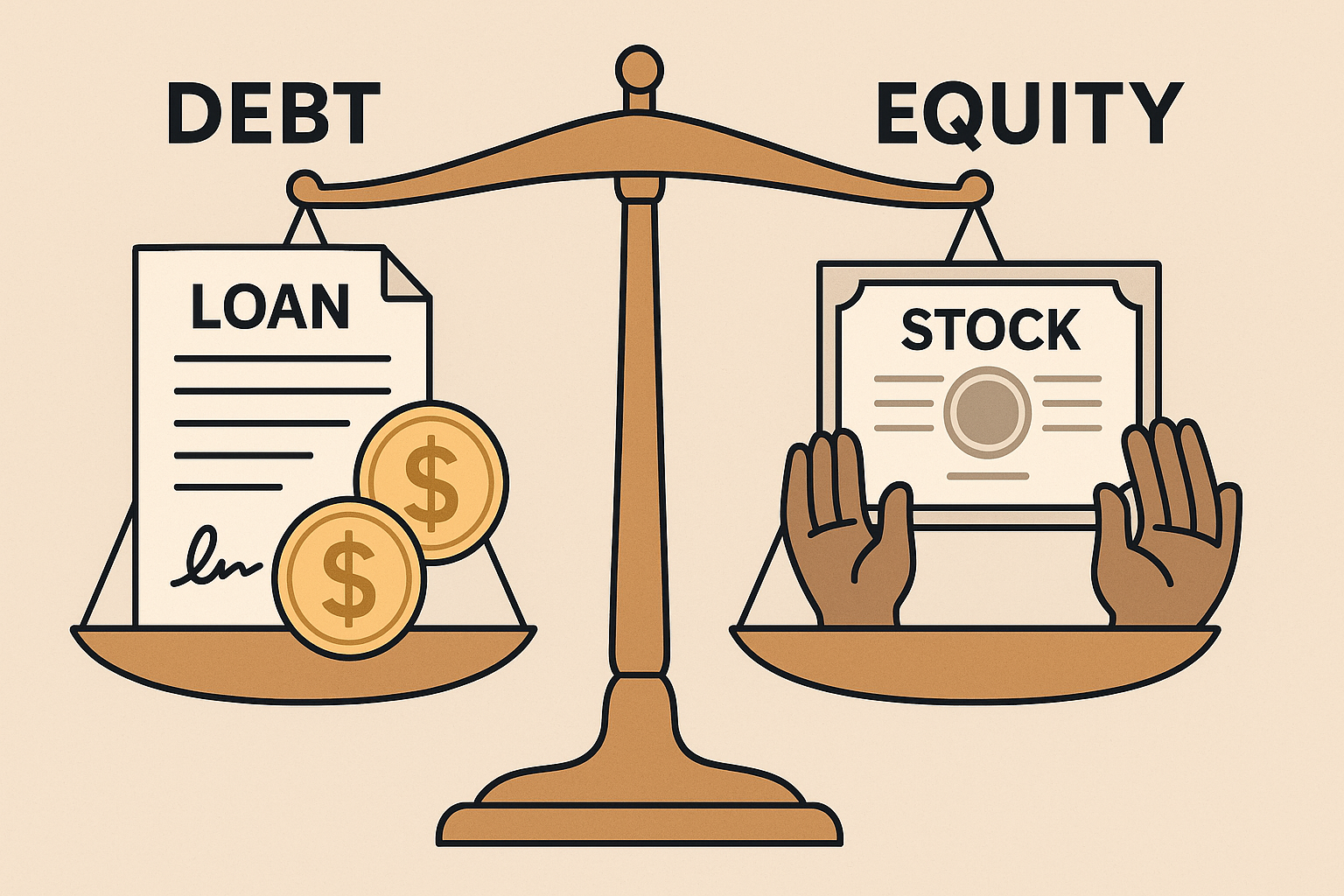1 (800) 584-0324
Every entrepreneur faces a fundamental question when raising capital: Should I finance my business with debt or equity?
Both approaches—borrowing money or selling shares—can fuel growth, but they come with very different trade-offs in terms of ownership, risk, and flexibility. Understanding debt vs equity financing is key to making the right choice for your company’s stage and goals.
What Is Debt Financing?
Debt financing means borrowing money that must be repaid, typically with interest. This includes:
- Bank loans
- Lines of credit
- Bonds or private credit facilities
- Government-backed loans (e.g., SBA 7(a) in the U.S. or CSBFP in Canada)
Advantages:
✅ Maintain full ownership and control
✅ Interest payments are tax-deductible
✅ Predictable repayment schedule
Drawbacks:
❌ Fixed repayment obligations, even during downturns
❌ Higher risk of default if cash flow weakens
❌ May require collateral or personal guarantees
What Is Equity Financing?
Equity financing involves selling ownership shares in your company to investors. This includes:
- Angel investors
- Venture capital funds
- Private equity firms
- Equity crowdfunding
Advantages:
✅ No repayment obligation
✅ Brings in partners with capital, expertise, and networks
✅ Flexible structure—investors profit only if the business succeeds
Drawbacks:
❌ Dilution of ownership and decision-making power
❌ Investors may push for aggressive growth or exit strategies
❌ Potential conflicts between founders and shareholders
Debt vs Equity Financing: Side-by-Side Comparison
| Factor | Debt Financing | Equity Financing |
| Ownership | 100% founder-owned | Diluted ownership |
| Repayment | Required (fixed schedule + interest) | None (returns via profit/exit) |
| Risk | Default risk if revenue dips | Shared risk with investors |
| Control | Full control retained | Investors may seek board seats |
| Tax Impact | Interest is tax-deductible | Dividends not tax-deductible |
| Best For | Businesses with steady cash flow | Startups or high-growth ventures |
When to Choose Debt Financing
- Your business has predictable revenue and cash flow
- You want to maintain full control and ownership
- The need is for specific projects (equipment, working capital, expansion)
- You can access favorable rates through government-backed programs
When to Choose Equity Financing
- Your company is early-stage or pre-revenue
- You need large amounts of capital to scale rapidly
- Strategic expertise and networks are as valuable as money
- You’re open to sharing ownership for long-term growth
Hybrid Approaches
Many businesses blend debt and equity:
- Venture debt alongside VC equity
- Convertible notes or SAFEs for early-stage startups
- Revenue-based financing as a flexible middle ground
A hybrid approach balances risk, preserves some ownership, and diversifies funding sources.
U.S. and Canada Context
- United States: Wide access to debt (SBA loans, private credit funds) and equity (angels, VCs, PE firms). Equity dominates high-growth sectors like tech.
Canada: More conservative equity markets, with strong debt options through BDC and provincial programs. Equity often concentrated in Toronto, Vancouver, and Montreal ecosystems.
Not sure whether debt vs equity financing is right for your business? Agile Solutions helps companies in the U.S. and Canada structure tailored funding strategies—combining loans, equity, and hybrid models to meet growth goals.
👉 Book a consultation today at agilesolutions.global or email us at info@agilesolutions.global
#DebtFinancing #EquityFinancing #BusinessFunding #StartupFunding #GrowthCapital #VentureCapital #AngelInvestors #CapitalMarkets



